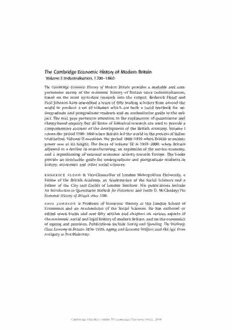
The Cambridge Economic History of Modern Britain : Volume 1 : Industrialisation, 1700–1860 PDF
Preview The Cambridge Economic History of Modern Britain : Volume 1 : Industrialisation, 1700–1860
TheCambridgeEconomicHistoryofModernBritain VolumeI:Industrialisation,1700–1860 The Cambridge Economic History of Modern Britain provides a readable and com- prehensive survey of the economic history of Britain since industrialisation, based on the most up-to-date research into the subject. Roderick Floud and PaulJohnsonhaveassembledateamoffiftyleadingscholarsfromaroundthe world to produce a set of volumes which are both a lucid textbook for un- dergraduateandpostgraduatestudentsandanauthoritativeguidetothesub- ject.Thetextpaysparticularattentiontotheexplanationofquantitativeand theory-basedenquiry,butallformsofhistoricalresearchareusedtoprovidea comprehensive account of the development of the British economy. Volume I coverstheperiod1700–1860whenBritainledtheworldintheprocessofindus- trialisation.VolumeIIexaminestheperiod1860–1939whenBritisheconomic power was at its height. The focus of volume III is 1939–2000, when Britain adjustedtoadeclineinmanufacturing,anexpansionoftheserviceeconomy, and a repositioning of external economic activity towards Europe. The books provide an invaluable guide for undergraduate and postgraduate students in history,economicsandothersocialsciences. roderick floud is Vice-Chancellor of London Metropolitan University, a Fellow of the British Academy, an Academician of the Social Sciences and a Fellow of the City and Guilds of London Institute. His publications include AnIntroductiontoQuantitativeMethodsforHistoriansand(withD.McCloskey)The EconomicHistoryofBritainsince1700. paul johnson is Professor of Economic History at the London School of Economics and an Academician of the Social Sciences. He has authored or edited seven books and over fifty articles and chapters on various aspects of theeconomic,socialandlegalhistoryofmodernBritain,andontheeconomics ofageingandpensions.PublicationsincludeSavingandSpending:TheWorking- ClassEconomyinBritain1870–1939;AgeingandEconomicWelfare;andOldAge:From AntiquitytoPost-Modernity. Cambridge Histories Online © Cambridge University Press, 2008 Cambridge Histories Online © Cambridge University Press, 2008 The Cambridge Economic History of Modern Britain Volume I: Industrialisation, 1700–1860 Edited by Roderick Floud LondonMetropolitanUniversity and Paul Johnson LondonSchoolofEconomics Cambridge Histories Online © Cambridge University Press, 2008 published by the press syndicate of the university of cambridge ThePittBuilding,TrumpingtonStreet,Cambridge,UnitedKingdom cambridge university press TheEdinburghBuilding,CambridgeCB22RU,UK 40West20thStreet,NewYorkNY10011–4211,USA 477WilliamstownRoad,PortMelbourne,VIC3207,Australia RuizdeAlarcón13,28014Madrid,Spain DockHouse,TheWaterfront,CapeTown8001,SouthAfrica http://www.cambridge.org (cid:1)C CambridgeUniversityPress2004 Thisbookisincopyright.Subjecttostatutoryexception andtotheprovisionsofrelevantcollectivelicensingagreements, noreproductionofanypartmaytakeplacewithout thewrittenpermissionofCambridgeUniversityPress. Firstpublished2004 Thirdprinting2006 PrintedintheUnitedKingdomattheUniversityPress,Cambridge TypefaceSwift9.5/12.5pt.andFormata SystemLATEX2ε [tb] AcataloguerecordforthisbookisavailablefromtheBritishLibrary LibraryofCongressCataloguinginPublicationdata TheCambridgeeconomichistoryofmodernBritain/editedbyRoderickFloud andPaulJohnson. p. cm. Includesbibliographicalreferencesandindex. Contents:v.1.Industrialisation,1700--1860--v.2.Economicmaturity,1860--1939--v.3. Structuralchangeandgrowth,1939--2000. ISBN0521820367(v.1)--ISBN0521527368(pb.)--ISBN0521820375(v.2)-- ISBN0521527376(pb.)--ISBN0521820383(v.3)--ISBN0521527384(pb.) 1.GreatBritain--Economicconditions. 2.GreatBritain--Economic conditions--18thcentury. 3.GreatBritain--Economicconditions–19thcentury. 4.GreatBritain--Economicconditions--20thcentury. I.Title:Economichistoryof modernBritain. II.Floud,Roderick. III.Johnson,Paul(PaulA.) HC253.C36 2003 330.941(cid:2)08--dc21 2003046169 ISBN0521820367 ISBN0521527368 Cambridge Histories Online © Cambridge University Press, 2008 To Louisa and Oriana Cambridge Histories Online © Cambridge University Press, 2008 Cambridge Histories Online © Cambridge University Press, 2008 Contents List of figures ix List of tables xi List of contributors xiv Preface xvii Chapter 1 Accounting for the Industrial Revolution 1 joel mokyr Chapter 2 Industrial organisation and structure 28 pat hudson Chapter 3 British population during the ‘long’eighteenth century, 1680–1840 57 e. a. wrigley Chapter 4 Agriculture during the industrial revolution, 1700–1850 96 robert c. allen Chapter 5 Industrialisation and technological change 117 kristine bruland Chapter 6 Money, finance and capital markets 147 stephen quinn Chapter 7 Trade: discovery, mercantilism and technology 175 c. knick harley Chapter 8 Government and the economy, 1688–1850 204 ron harris Chapter 9 Household economy 238 jane humphries Chapter 10 Living standards and the urban environment 268 hans-joachim voth Chapter 11 Transport 295 simon ville Cambridge Histories Online © Cambridge University Press, 2008 viii Contents Chapter 12 Education and skill of the British labour force 332 david mitch Chapter 13 Consumption in eighteenth- and early nineteenth-century Britain 357 maxine berg Chapter 14 Scotland 388 t. m. devine Chapter 15 The extractive industries 417 roger burt Chapter 16 The industrial revolution in global perspective 451 stanley l. engerman and patrick k. o’brien Bibliography 465 Index 505 Cambridge Histories Online © Cambridge University Press, 2008 Figures 3.1 English population totals, 1681–1841 page 61 3.2 Changes in English demographic rates, 1681–1841 66 3.3 The combined effect of fertility and mortality in determining intrinsic growth rates, 1666–1841 68 3.4 Long-term trends in birth intervals 72 3.5 Mean age at marriage: bachelor/spinster marriages 74 3.6 Marriage age combinations: bachelor/spinster marriages 75 3.7 Crude first marriage rates and real wage trends 78 3.8 Urban growth in England, France and the Netherlands 89 4.1 Output per worker in agriculture, 1300–1800 98 6.1 Sectoral shares of London stock market in 1873 149 6.2 Deposits, bills, coins and banknotes in 1873 150 6.3 Innovation of the payment system, 1688–1870 152 6.4 Supply and demand for industrial finance c. 1790 161 6.5 Price of gold in London, 1790–1830 163 7.1 British exports, 1660s, 1700s and 1770s 178 7.2 Terms of trade, 1796–1913 194 7.3 Exports as proportion of national income, 1700–1913 199 7.4 Tariff revenues as percentage of value of retained imports 201 8.1 Total tax revenue, 1665–1805 215 8.2 Employees in fiscal bureaucracy, 1690–1782/3 216 8.3 Growth of national debt, 1690–1780s 217 8.4 Allocation of government expenditure, 1665–1805 218 9.1 Contributions to household income 259 10.1 Real earnings in Great Britain, 1781–1855 272 10.2 Working hours in Britain in the long run 278 10.3 Composition of working-class expenditures, 1788/92 282 10.4 Life expectancy at birth (in years) in selected cities and areas, 1841 285 10.5 Pseudo-HDI for Britain, the USA, Sweden and Germany 290 11.1 Transport’s share of gross domestic fixed capital formation in Great Britain, 1761–1860 321 12.1 Estimated illiteracy of men and women in England, 1500–1900 344 Cambridge Histories Online © Cambridge University Press, 2008 x Listoffigures 12.2 Estimated annual percentage of males and females unable to sign at marriage, 1754–1840 345 14.1 Scotland 390 14.2 The Central Lowlands of Scotland 405 15.1 Volume and value of mine output, 1720s and 1857 421 Cambridge Histories Online © Cambridge University Press, 2008
